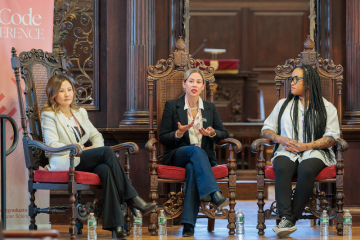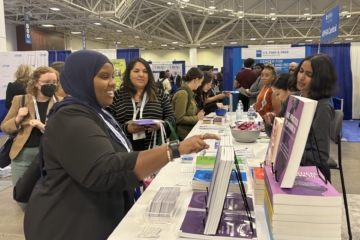Read Alison’s bio. See all 40 Under 40 honorees.
Five Questions for Alison

Alison co-presented with a North Dakota suicide loss survivor at a Department of Public Instruction-hosted meeting for educators in tribal communities.
1. Who or what inspired you to enter the field of public health?
Working as a crisis social worker in rural and tribal communities across North Dakota, I saw that clinicians were underprepared when it came to suicide, and many residents suffered in silence. It is a lonely, silent disease. I felt that we could do better at a system level in compulsory training, protocols, and primary prevention. I went back to school to get my MPH in policy and administration and have been working to build engagement across the state. Our coalition is 200 strong, largely made up of survivors.
2. What is one of the most interesting projects you’ve worked on in public health?
To me, it’s been seeing youth become leaders in 58 schools across North Dakota through the evidence-based Sources of Strength program. This program allows the students share their own stories of hope, help, and strength and spread positive social norms across the school. One young football player testified in front of the 2016 legislative interim committee, saying that “ [I] had never told anyone that I was so depressed.” The program changed the way he saw the world and how he saw himself. Youth that have never spoken in class stand up in front of assemblies to share their powerful stories of resiliency and lead thought-provoking games. Through this program, adult leaders become powerful mentors for student, and 50 percent more kids are identified and get connected to help before it is too late.
3. What are the greatest challenges you face in your work?
The myth that we cannot change behavior and that “people are going to do what they are going to do.” We need to focus more on countering this myth here in North Dakota. We will reverse the suicide trend in North Dakota when people believe that suicide can be prevented. We can do it, but we need to invest at the same level we have in other diseases and conditions.
4. What’s a story or experience that keeps you going, even when you’re feeling challenged?
I think of the grit, voices, and stories shared by suicide survivors in North Dakota. I think of how they create change and entire movements in our state. Survivors here take initiative to schedule meetings with their representatives or even the governor. In addition, student suicide attempt survivors like Kennedy Gjovik change laws in North Dakota. By bravely sharing her story of struggle and recovery, schools have more support for mental health.
5. Describe yourself in three words.
“Empathic” and “fierce advocate.”




